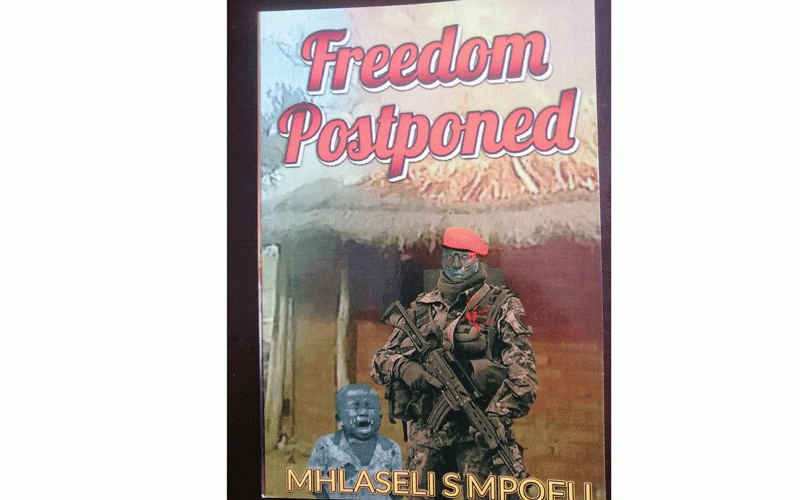
Title: FREEDOM POSTPONED
Author: Mhlaseli Mpofu
Year of Publication: 2022
Number of pages: 135 (A5 pages) (Ten chapters)
Publisher: Ingwaladi Publishers Nkulumane, Bulawayo.
FREEDOM Postponed is an English novel set in Jotsholo Lupane, about 201km North West of Bulawayo along the Victoria Falls Highway. The novel captures the pre-and early post-independence period which was marred by conflict in Zimbabwe. The book cover is telling: it depicts a typical Ndebele hut burning, a huge AK47 armed soldier in full combat gear with a distinctive red beret and splashes of red on his left side of the chest. By his side just at the level of his gun magazine, there is a crying child with tears streaming to his open mouth. Undeterred, the soldier is stern faced.
The story of the novel is wholly told by the cover. Chapter one plunges the reader right into the February/March 1983 scene around Jotsholo, where government-sponsored soldiers generally referred to as Gukurahundi were unleashed on the population. The novel describes the army group as cruel and fierce purportedly in search of dissidents sponsored by Zapu. Their orders were to clean out trash from Matabeleland. Villagers in and around Jotsholo were rounded up, but in the main were those ex-Zipra combatants who had been demobilized. They were headed into Jotsholo Rest Camp where they were beaten and even killed. This is the gist of the story.
Chapter two looks at Jotsholo through the rear view mirror; the brief history pre independence. A spotlight is shown on how life was through Ndebele families Gumede, Zondo, Ndiweni, Dlamini, Dlodlo, Fuyane and Mkwananzi. These are the descendents of the Lobengula group which survived Pupu and chose to settle among the local people. There are very few key characters in the Jotsholo outpost. The dusty village has its bottle store centrifuge. Everybody meets there.
- Mnangagwa’s call out to war veterans welcome
- Zim needs monarch system, says prophet
- Interview: CAPS tussle: Mutanda bares it all
- US$20bn lawsuit divides Zipra
Keep Reading
When the liberation war arrives in Jotsholo, young men, though strongly dissuaded by their parents join the armed struggle. Fatima Catholic Mission is caught up in the war of liberation which forces both Goodmuntu Gumede’s sons, Mbizo and Liwe to join the liberation struggle despite their fathers displeasure.
Chapters three to six, narrate the return of the boys from exile, Zapu losing the vote, the prevailing climate and the creation of dissidents. Zimbabwean politics descends into a low ebb of tribalism. Speaking Ndebele is frowned on and many in Matabeleland become endangered species.
Like in any war, women become toys of war and victims of machoism.
The beautiful Mukoma Jokonya and Major Makova arrived in Jitsholo. The former had lived and hung around in Jotsholo for a long time and the later was a newly arrived Commander of the Fifth Brigade unit based in Jotsholo and commanded from Lupane.
They carried lists of people they wanted to kill, often squeezed out of people who had been tortured and were of clear death row.
Major Makova wrestled Ntombifuthio from Jokonya and raped her.
Chapter Four narrates a chilling account of what happened to Ntombifuthi. The pain of being raped and a feeling of helplessness. All she could ask for was that ”I have a child are you going to kill me after you…”. This represents what many woman went through.
Chapters seven to eight narrate Lizwe’s escape to Bulawayo, his brief stay with his uncle in Njube Township and his final escape to South Africa. The other flint stone ray of hope is when Mukoma Jokonya saved the Gumede family from certain death when they were rounded up after Lizwe’s escape to Bulawayo. Jokonya telephones someone in Harare, who orders that the Gumedes be spared. They were spared.
Chaperts nine and ten highlight Lizwe’s brief stay in South Africa and Zanu PF and Zapu détente. Life in South Africa was not easy and Lizwe finds his way home to Jotsholo. He spends time in Bulawayo enjoying football before summoning energy to return to Jotsholo.
Unfortunately he had to travel under cover of darkness. He arrived home at night and the warrior-liken almost mistakenly kills him because he thought it was a Gukuraundi intruder. The reader is left swinging to religion and hoping that Lizwe survives.
This is a simple novel worth reading. It is captivating and an honest reflection of the times. In the times of social media and twitter, people would not like too long stories.
They want reads to be to the point.
The quality of the print leaves a lot to be desired.
From page 80, it looks like a cheap photocopy with ink smudges and faded words, which cannot be read.
At least that was the batch of the book I read.
As a community publication, I recommend the novel.










